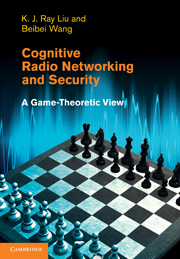Book contents
- Frontmatter
- Contents
- Preface
- Part I Cognitive radio communications and cooperation
- Part II Resource awareness and learning
- Part III Securing mechanism and strategies
- 15 Trust modeling and evaluation
- 16 Defense against routing disruptions
- 17 Defense against traffic-injection attacks
- 18 Stimulation of attack-resistant cooperation
- 19 Optimal strategies for stimulation of cooperation
- 20 Belief evaluation for cooperation enforcement
- 21 Defense against insider attacks
- 22 Secure cooperation stimulation under noise and imperfect monitoring
- References
- Index
22 - Secure cooperation stimulation under noise and imperfect monitoring
from Part III - Securing mechanism and strategies
Published online by Cambridge University Press: 06 December 2010
- Frontmatter
- Contents
- Preface
- Part I Cognitive radio communications and cooperation
- Part II Resource awareness and learning
- Part III Securing mechanism and strategies
- 15 Trust modeling and evaluation
- 16 Defense against routing disruptions
- 17 Defense against traffic-injection attacks
- 18 Stimulation of attack-resistant cooperation
- 19 Optimal strategies for stimulation of cooperation
- 20 Belief evaluation for cooperation enforcement
- 21 Defense against insider attacks
- 22 Secure cooperation stimulation under noise and imperfect monitoring
- References
- Index
Summary
In this chapter we address cooperation stimulation in realistic yet challenging contexts where the environment is noisy and the underlying monitoring is imperfect. We have first explored the underlying reasons why stimulating cooperation under such scenarios is difficult. Instead of trying to force all nodes to act fully cooperatively, our goal is to stimulate cooperation in a hostile environment as much as possible through playing on conditional altruism. To formally address the problem, we have modeled the interactions among nodes as secure-routing and packet-forwarding games under noise and imperfect observation, and devised a set of reputation-based attack-resistant cooperation strategies without requiring any tamper-proof hardware or a central banking service. The performance of the devised strategies has also been evaluated analytically. The limitations of the game-theoretic approaches and the practicability of the devised strategies have also been investigated through both theoretical analysis and extensive simulation studies. The results have demonstrated that, although sometimes there may exist a gap between the ideal game model and the reality, game-theoretic analysis can still provide thought-provoking insights and useful guidelines when designing cooperation strategies.
Introduction
In this chapter, instead of trying to force all nodes to act fully cooperatively, our goal is to stimulate cooperation among selfish nodes as much as possible without relying on any tamper-proof hardware or a central banking service.
- Type
- Chapter
- Information
- Cognitive Radio Networking and SecurityA Game-Theoretic View, pp. 545 - 569Publisher: Cambridge University PressPrint publication year: 2010



